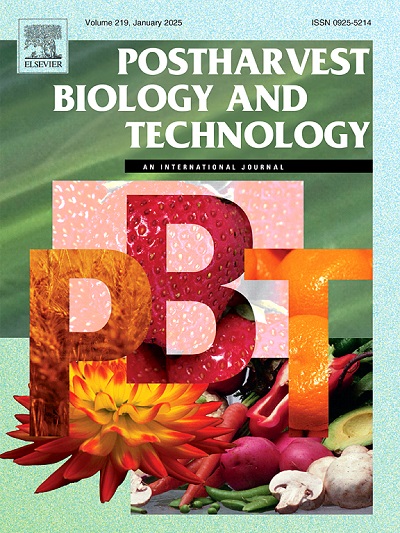Ectoine inhibits postharvest decay of nectarine fruit by strengthening fruit resistance
IF 6.4
1区 农林科学
Q1 AGRONOMY
引用次数: 0
Abstract
Postharvest diseases caused by fungal infections in nectarine fruit seriously affect its commodity value and economic benefits. The effects and mechanisms of application of amino acid derivative ectoine against decay mold disease on postharvest nectarine fruit were evaluated. Ectoine remarkably reduced the occurrence of brown rot in nectarines after inoculation with Monilinia fructicola, which was most likely achieved by enhancing the resistance of the fruit. The expression of genes such as phenylalanine ammonia-lyase in ethylene transduction pathway were downregulated and the expressions of jasmonic acid and salicylic acid were upregulated with ectoine treatment. Moreover, the activities of key enzymes such as β-1,3-glucanase and superoxide dismutase for antibacterial and antioxidation activities, respectively, were enhanced. Phenylpropane biosynthesis was then activated and antioxidant capacity was enhanced. As a result, ectoine improved the resistance of nectarine fruit against fungal diseases. This study provides a new and promising approach to reduce postharvest decay of nectarine.
求助全文
约1分钟内获得全文
求助全文
来源期刊

Postharvest Biology and Technology
农林科学-农艺学
CiteScore
12.00
自引率
11.40%
发文量
309
审稿时长
38 days
期刊介绍:
The journal is devoted exclusively to the publication of original papers, review articles and frontiers articles on biological and technological postharvest research. This includes the areas of postharvest storage, treatments and underpinning mechanisms, quality evaluation, packaging, handling and distribution of fresh horticultural crops including fruit, vegetables, flowers and nuts, but excluding grains, seeds and forages.
Papers reporting novel insights from fundamental and interdisciplinary research will be particularly encouraged. These disciplines include systems biology, bioinformatics, entomology, plant physiology, plant pathology, (bio)chemistry, engineering, modelling, and technologies for nondestructive testing.
Manuscripts on fresh food crops that will be further processed after postharvest storage, or on food processes beyond refrigeration, packaging and minimal processing will not be considered.
 求助内容:
求助内容: 应助结果提醒方式:
应助结果提醒方式:


